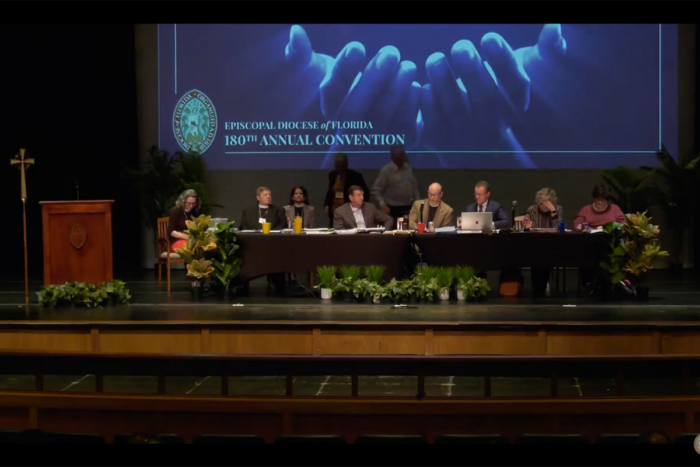Diocese of Florida Episcopalians, in written feedback, lament ‘culture of acrimony and distrust’ in diocesePosted Jan 23, 2024 |
|
[Episcopal News Service] The Diocese of Florida Standing Committee released a consultant’s summary of her listening sessions and dozens of letters she received last year from Episcopalians in the diocese, underscoring the deep divisions that diocesan leaders hope to begin mending at a convocation set for Jan. 27.
The four-page summary was drafted by the Rt. Rev. Mary Gray-Reeves, who is trained in conflict mediation and was retained as a consultant by the Diocese of Florida as it navigates a tumultuous leadership transition. Gray-Reeves, the former bishop of the Diocese of El Camino Real, now serves as managing director of the College for Bishops.
Florida Bishop John Howard, who retired on Oct. 31 after 20 years with the diocese, had been accused of a pattern of discrimination toward LGBTQ+ clergy and their supporters. Tensions over his leadership flared publicly after the diocese tried twice in 2022 to elect a bishop to succeed him. Both elections were successfully blocked by objections filed by some Florida clergy and lay leaders, leaving Florida unable to consecrate a new bishop.
In the interim, retired Georgia Bishop Scott Benhase is serving Florida as a part-time assisting bishop, with help from retired New Jersey Bishop Chip Stokes. The standing committee serves as the diocese’s ecclesiastical authority during the diocesan bishop vacancy. The Jacksonville-based Diocese of Florida is one of five Episcopal dioceses in the state.
Gray-Reeves, in addition to meeting last year with key groups in the diocese, invited Episcopalians to share their thoughts and feelings on the state of the diocese in confidential letters. Gray-Reeves’ summary, dated Dec. 30 and released Jan. 22, indicates she received 71 responses.
“Most letters expressed concern for the overall health and well-being of the diocese, offering prayers and sincere hope for its recovery,” she said. “There was concern that the level of conflict, the general culture of acrimony and distrust, were significant barriers to a productive future.”
Many letters raised administrative concerns, Gray-Reeves said. “Among these letters were concerns about Bishop Howard’s impact as a leader,” as well as Howard’s former canon to the ordinary, the Rev. Allison DeFoor. Some encounters with Howard and DeFoor were described as “disrespectful to the individual or congregations, biased or inconsistent with canons or diocesan parties.”
Some letters also identified perceived bias and exclusion relating to LGBTQ+ persons, as well as women and people of color.
“A few letters reflected upset and disappointment in the outcome of the [bishop] election process,” Gray-Reeves continued, both from those who thought the winner of the elections, the Rev. Charlie Holt, should have been consecrated and those who objected to his election.
“The level of conflict is obviously very high in the Diocese of Florida,” she said. “The climate of the diocese is one currently governed by conflict generally, characterized by deep mistrust, fear, hurt, isolation and lowered functioning, productivity and innovation. What was expressed in the letters typifies, I believe, a psychologically unsafe environment.”

The Diocese of Florida holds its convention Nov. 11 at the Episcopal School of Jacksonville, as seen on video of the proceedings.
Gray-Reeves plans to attend the Jan. 27 convocation at the diocese’s Camp Weed, which was scheduled by the standing committee as part of the ongoing healing process in the diocese. This is intended as the first of three such convocations, with attendance expected by all clergy in the diocese and at least two lay leaders from each congregation.
“These will offer a safe space for diocesan members to engage in processes that will lead to reconciliation between groups and individual members of the diocese, the wider diocese and The Episcopal Church,” the convocation steering committee says in its online invitation. “The longer-term objective of the convocations and the homework built into the process is to cultivate tools for reconciliation and healing that will ultimately become part of the cultural pattern in the life of the diocese.”
– David Paulsen is a senior reporter and editor for Episcopal News Service. He can be reached at dpaulsen@episcopalchurch.org.

Social Menu